Introduction
Neurodiversity is a powerful concept that challenges traditional views on neurological differences, such as autism and ADHD, by recognizing and celebrating them as natural variations of the human brain. This perspective shift from seeing these differences as disorders to appreciating them as part of human diversity opens new avenues for inclusivity and innovation. By exploring the neurodiversity movement, its impact on education and employment, and the importance of tailored support strategies, this article delves into how embracing neurodiversity enriches society.
It also highlights the critical role of advocacy organizations in driving policy changes and fostering environments where neurodivergent individuals can thrive. Through understanding, inclusion, and empowerment, the potential of neurodivergent individuals can be fully realized, benefiting not just the individuals themselves but society as a whole.
Understanding Neurodiversity
Neurodiversity is the concept that neurological differences, such as autism and ADHD, are natural variations of the human brain. This perspective emphasizes that these differences should be recognized and respected as part of human diversity rather than viewed solely as disorders. By accepting cognitive diversity, we can change the story from one of lack to one of worth, acknowledging the distinct strengths and viewpoints that individuals with different mental processes contribute to society. Programs like Microsoft's initiative for hiring individuals with diverse cognitive profiles, which has onboarded over 300 such employees since 2015, exemplify how creating inclusive environments can tap into this potential. These employees frequently collaborate with job coaches and mentors educated in diverse cognitive styles, demonstrating the importance of tailored support. Moreover, fostering a culture of psychological safety, where every team member feels safe to take risks and be themselves, can significantly enhance innovation and collaboration. Accepting cognitive diversity involves not only acknowledging but also honoring the distinct ways that diverse thinkers contribute to our workplaces and communities.
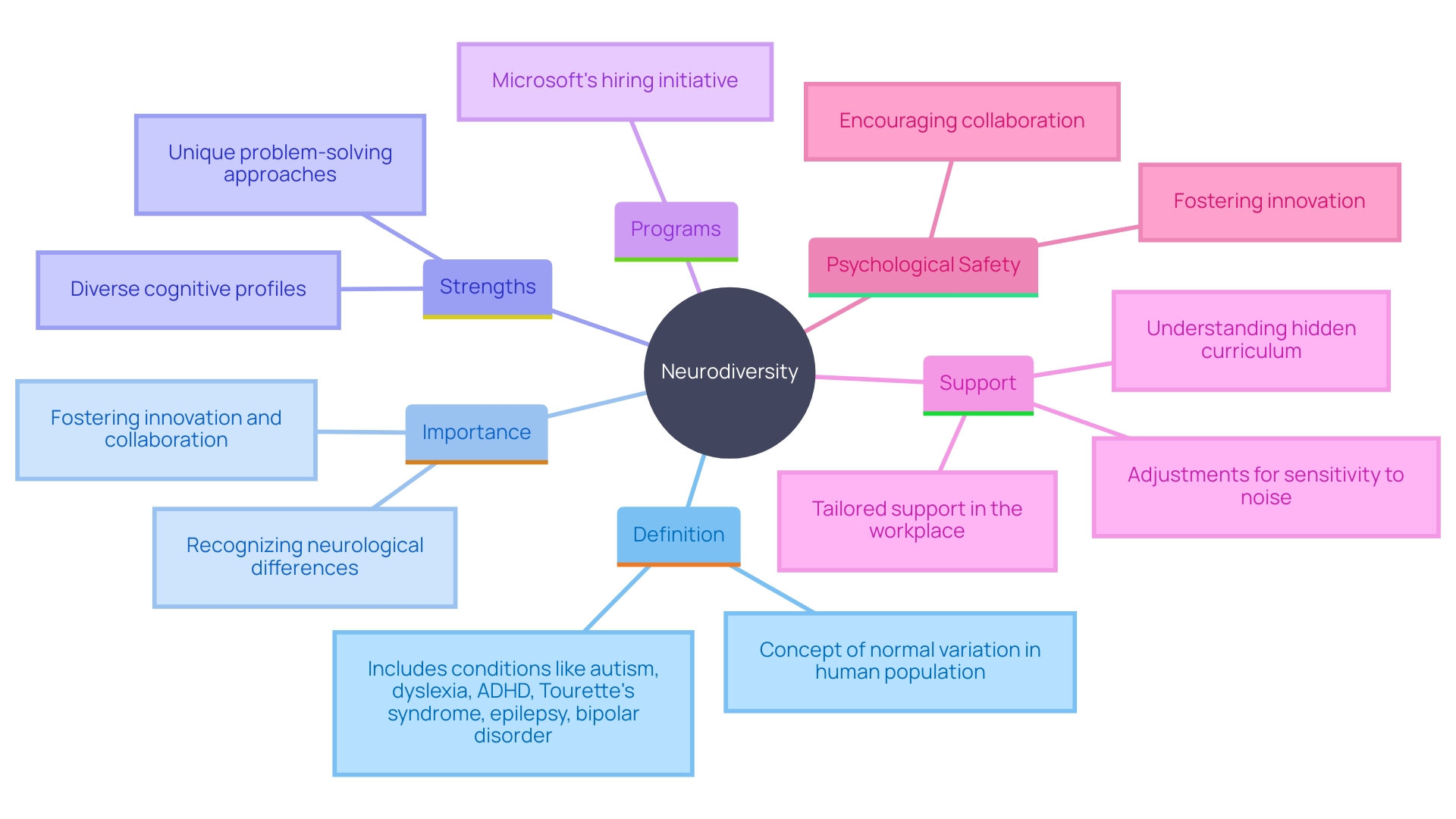
The Neurodiversity Movement and Its Impact
The neurodiversity initiative champions the acceptance and inclusion of neurodivergent individuals in every facet of life. 'This initiative has ignited crucial discussions about societal perceptions and treatment of those who think and learn differently.'. By advocating for a shift in mindset toward valuing diverse cognitive profiles, it promotes the idea that accommodations and supports are essential for enabling full participation in society.
The impact of this movement is evident in educational reforms, workplace inclusivity, and broader societal acceptance. For example, organizations such as Microsoft have led the way in hiring initiatives for diverse cognitive profiles, leading to substantial enhancements in workplace inclusivity. Since its inception in 2015, Microsoft's program has brought in about 300 full-time employees with diverse cognitive profiles. These employees receive tailored support, such as job coaches for time management and mentors for navigating the workplace, highlighting the importance of neurodiversity training for managers. This initiative, modeled after SAP's venture, has been embraced by other major companies like Dell and Ford, showcasing a growing acknowledgment of the value that diverse thinkers contribute to the workforce.
Furthermore, the initiative is influenced and molded by the lived experiences of neurodivergent people themselves. This is crucial in breaking the entrenched patterns where academic and medical experts often define quality of life without considering the voices of those they study. The initiative highlights the distinct characteristics and requirements of every person, promoting tailored support frameworks that honor their uniqueness.
Jonathan Holdowsky from Deloitte highlights the critical role of diverse minds in fostering true innovation. He argues that a homogenous way of thinking leads to stagnation, whereas diverse perspectives drive progress and problem-solving. This sentiment echoes the core of the neurodiversity movement, which asserts that embracing cognitive diversity is not just a moral imperative but also a catalyst for innovation and growth.
In the realm of research, there is a growing call for studies that focus on the strengths and resilience of individuals with diverse neurological profiles. As Elizabeth Pellicano's 2023 assessment reveals, the majority of autism research funding is still directed toward biological causes rather than services, support, and education. This imbalance emphasizes the need for a paradigm shift in research priorities to better reflect the needs and experiences of individuals with diverse neurological conditions. By showcasing the advantages of mental differences, research can play a vital role in changing societal narratives and fostering a more inclusive environment.
The neurodiversity movement, like other significant social movements, is reshaping civil discourse, laws, and ethics. By fostering understanding and acceptance, it enables diverse thinkers and their families to manage challenges and reach their full potential, ultimately enhancing society as a whole.
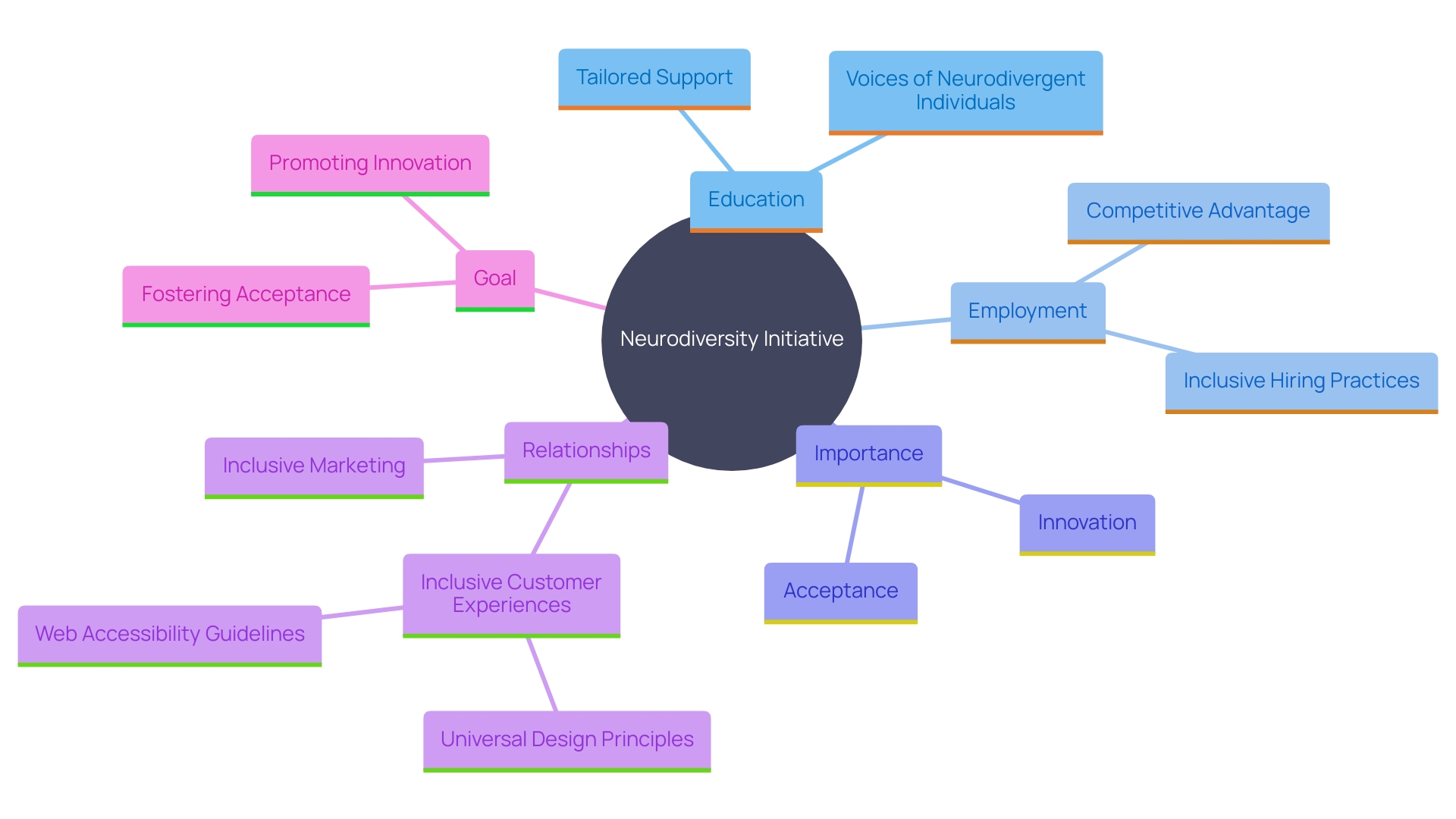
The Importance of Inclusion and Empowerment
Inclusion and empowerment are essential to the well-being of people with diverse neurological conditions. Advocacy efforts are essential in ensuring that neurodivergent individuals have equal access to education, employment, and community participation. 'The neurodiversity initiative, which has gained significant traction in recent years, emphasizes the value of diverse neurological conditions such as autism and ADHD.'. This movement departs from the traditional medical model, which often views these conditions as disorders needing a cure, and instead celebrates them as part of the rich tapestry of human diversity.
Empowering neurodivergent individuals involves providing the necessary tools, resources, and support for them to thrive. This means creating environments where their voices are heard and respected, allowing them to take active roles in shaping their own lives. As Jonathan Holdowsky from Deloitte Services LP suggests, true innovation arises from the rich tapestry of diverse minds and discordant thought. A society where every mind thinks alike would stagnate; thus, embracing neurodiversity is not only a matter of justice but also a catalyst for innovation.
The disability rights movement, akin to the civil rights, women's rights, and LGBTQ movements, continues to influence civil discourse, laws, and ethics. It underscores the importance of recognizing disability as a celebrated identity connected to a vibrant culture and community. With over 1 billion disabled people globally, including more than 61 million in the United States, the push for inclusive environments is more crucial than ever. This is especially pertinent as the COVID-19 pandemic exacerbates existing inequities faced by people with disabilities.
In advocacy, the principle of 'Nothing about us without us' is pivotal. 'Neurodivergent people should be integral in designing studies, presenting forums, and shaping policies that affect their lives.'. By embedding empathy and flexibility into our actions and language, we foster a more inclusive and respectful society for all.
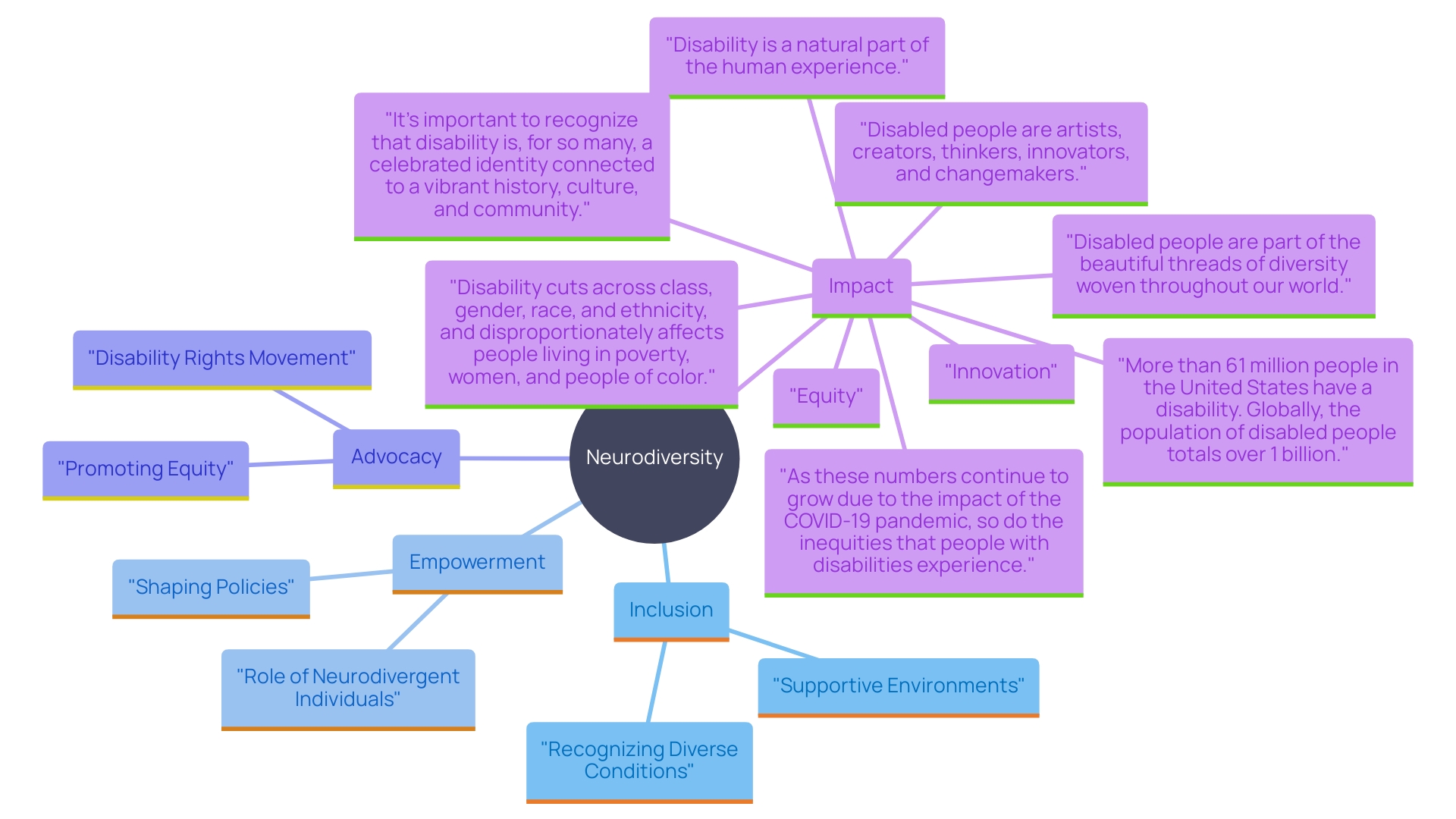
Strategies for Supporting Neurodivergent Individuals
Assisting people with diverse cognitive profiles effectively requires strategies that honor their unique needs and strengths. This involves creating individualized support plans within educational settings, promoting the development of social skills, and ensuring reasonable workplace accommodations. Each neurodivergent person should be acknowledged and treated as a distinct entity with their own preferred methods of support. As mentioned in the 'Understanding Neurodivergence at Work' toolkit, highlighting unique characteristics is essential for effective support.
Parents and advocates are instrumental in identifying and implementing these strategies. They assist in customizing methods that are most effective for each person, ensuring they are prepared to achieve their maximum potential. For instance, case studies highlight how workplaces have successfully adapted to support engineers with diverse cognitive profiles, demonstrating the importance of personalized accommodations.
Inclusive employment for diverse thinkers not only benefits the people involved but also contributes to economic growth. Studies have shown that companies actively hiring people with disabilities often outperform those that do not, with higher revenues, net income, and profit margins. This highlights the value that diverse-thinking employees contribute to the workplace, including unique perspectives, loyalty, and a positive work environment.
As Dr. David Offord emphasized, recognizing both the unmet needs and assets of neurodivergent individuals is fundamental to ensuring equity and supporting their participation in all aspects of life. This approach aligns with the broader movement that promotes viewing neurological differences as a natural and valuable part of human diversity.
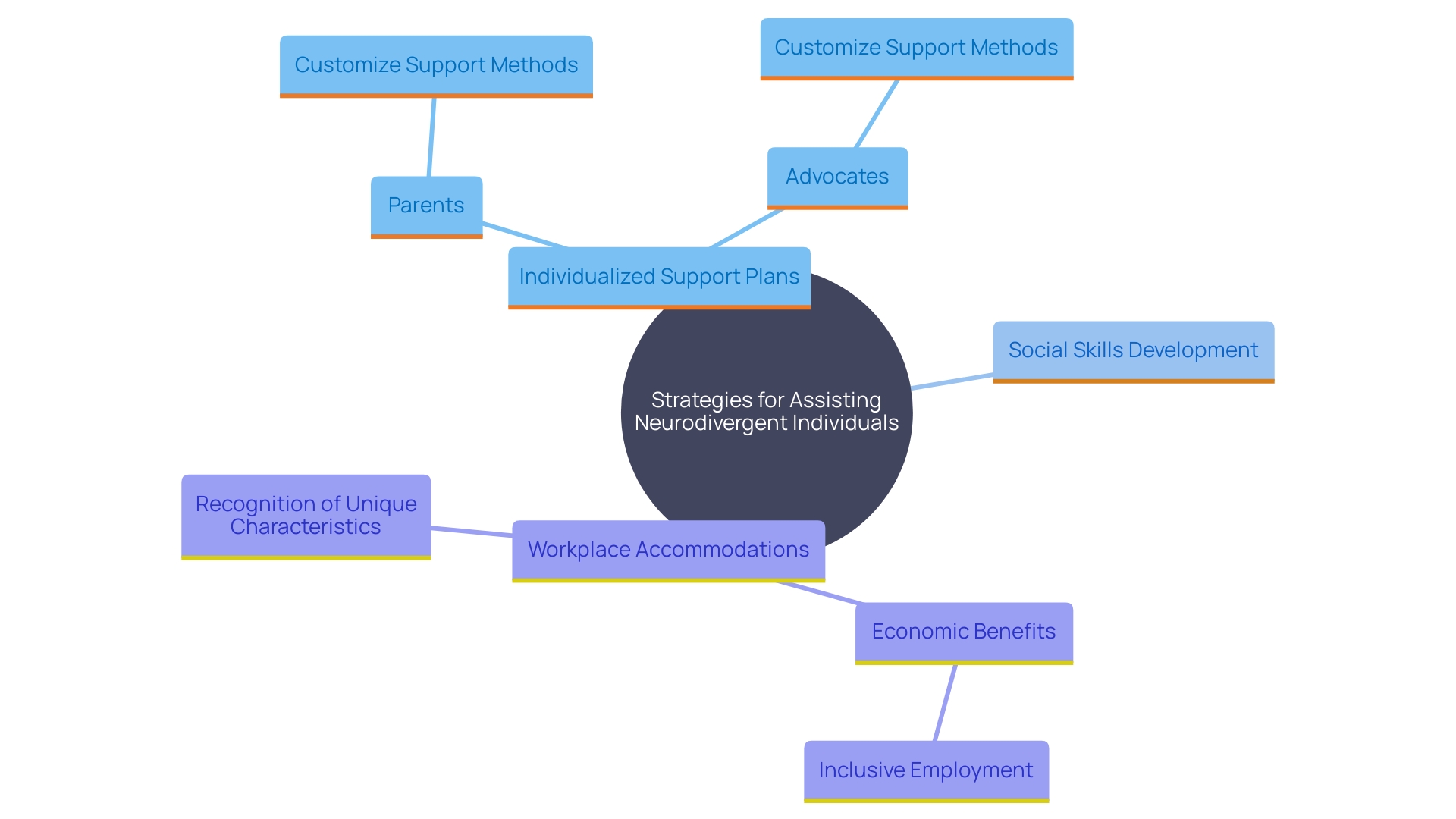
The Role of Advocacy Organizations
Advocacy organizations play a crucial role in championing neurodiversity and fostering inclusion. These groups tirelessly work to raise awareness, provide essential resources, and drive policy changes that benefit people with diverse neurological conditions. For instance, the Arc of the United States has partnered with the United Health Foundation to improve mental health services for people with developmental disabilities by enhancing coordination between systems and training thousands of providers and caregivers.
Such efforts are vital because, according to a recent study, inclusive employment of neurodiverse individuals can significantly boost economic growth, potentially adding up to $25 billion to the U.S. GDP. Companies that actively hire people with disabilities often see higher revenues and profit margins. This underscores the value of including neurodivergent perspectives in the workforce.
Moreover, initiatives like Neurodiversity Week highlight ongoing conversation and awareness, ensuring that this variety stays a key aspect of educational culture. These events, planned meticulously by neurodiversity champions, include accessible communications and community-building activities, helping to create an environment where all students feel seen and supported.
As Dr. David Offord aptly noted, “Engaged, peaceful, and well-supported participation of children and youth with disabilities in major life domains is a fundamental determinant of mental health.” This principle underpins the mission of advocacy organizations, which strive to make the 'race' fair for all children, recognizing their unique needs and strengths. By uniting efforts, these organizations are paving the way for a more inclusive and equitable society for everyone.
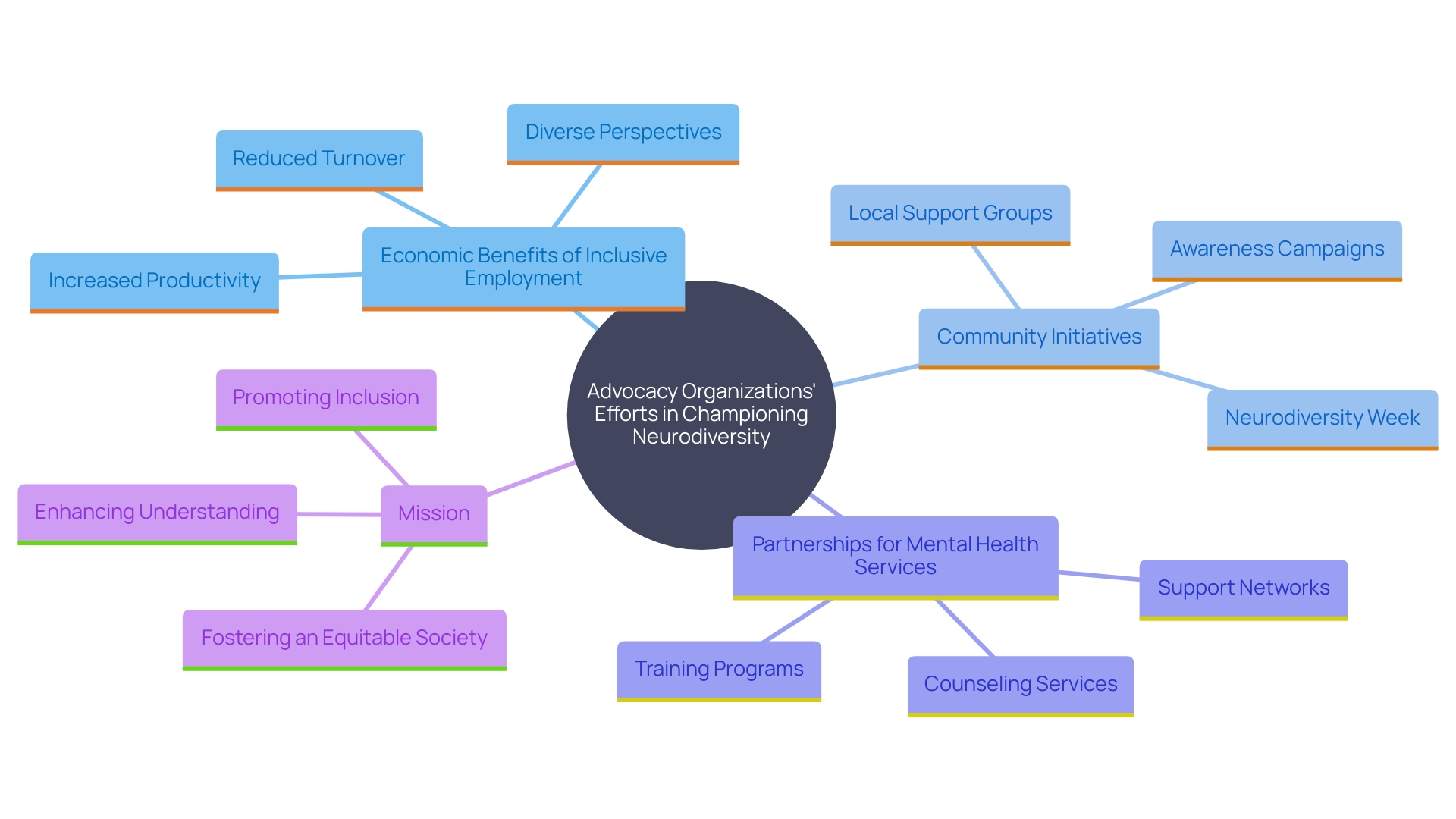
Pathways to Empowerment and Full Inclusion
Creating pathways to empowerment and full inclusion involves a multi-faceted approach. This includes advocacy for systemic changes in education and employment sectors, as well as grassroots initiatives that promote awareness and understanding within communities. Autistica estimates that around 1 in 70 people is autistic, with 680,000 people of working age in the UK reporting autism as a health condition. However, only about 3 in 10 working-age autistic people are employed, highlighting a significant employment gap that requires urgent attention.
To tackle these challenges, efforts must concentrate on altering employer actions, as illustrated in the Autism @ Work Playbook, which highlights not only hiring diverse minds but also aiding their career growth. Moreover, advocacy organizations such as the recently established Neurodistinct Leaders in Davos are striving to make dialogues more accessible and inclusive, ensuring diverse cognitive perspectives are acknowledged in global discussions.
Building supportive networks and fostering collaboration among stakeholders—parents, educators, employers, and advocates—is crucial. By doing so, we can create a society where neurodivergent individuals are not only accepted but celebrated for their contributions. As the disability rights movement shows, social movements have the power to change civil discourse, laws, and ethics, paving the way for a more inclusive future.
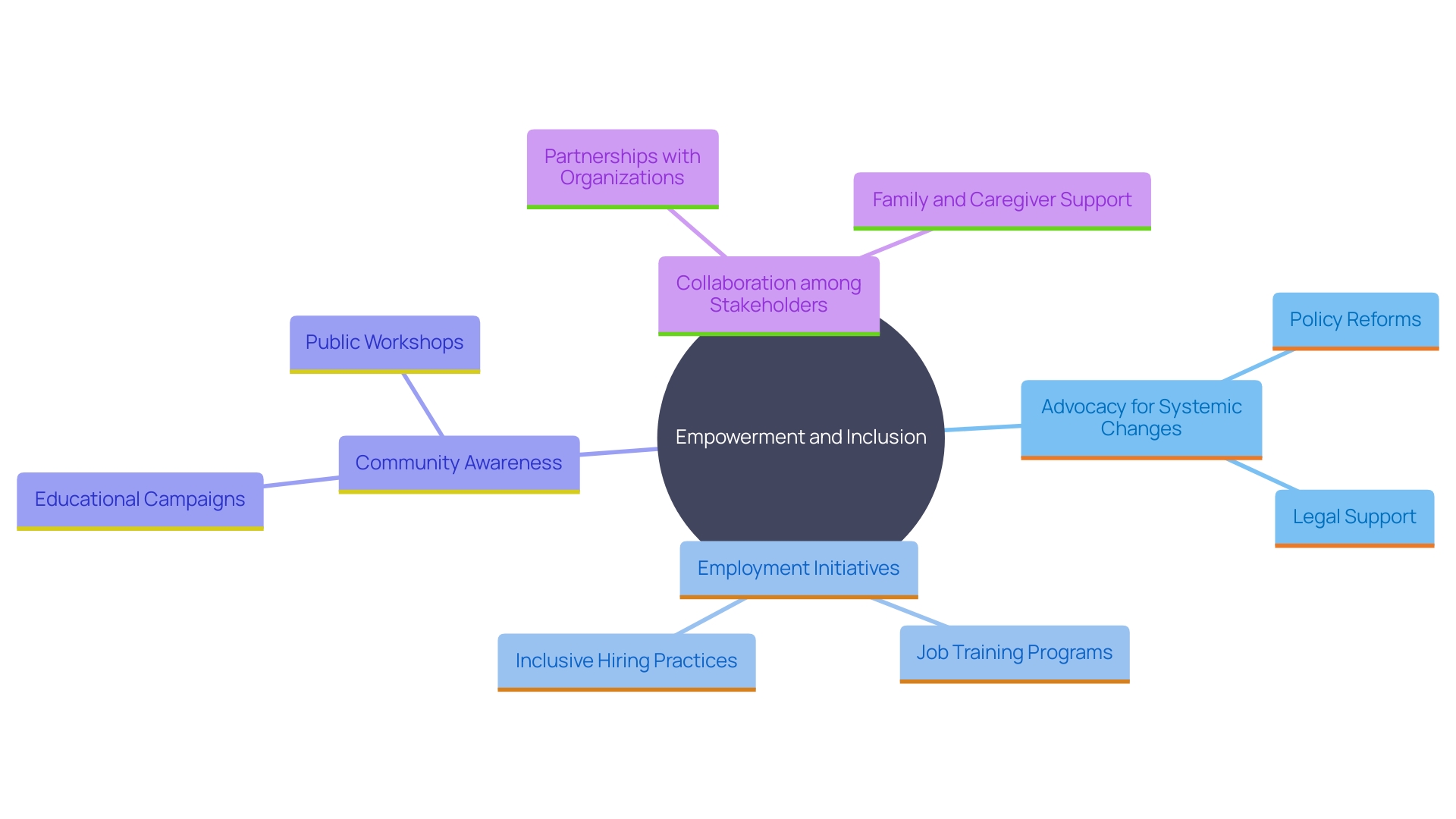
Conclusion
Embracing neurodiversity represents a transformative shift in understanding and valuing neurological differences. This concept positions conditions such as autism and ADHD as natural variations of the human experience, rather than deficits to be corrected. By recognizing the unique strengths and perspectives of neurodivergent individuals, society can move towards an inclusive environment that fosters innovation and collaboration.
Initiatives like Microsoft's neurodiversity hiring program exemplify how tailored support can unlock the potential of neurodivergent employees, demonstrating the tangible benefits of inclusivity in the workplace.
The neurodiversity movement has sparked essential conversations about societal perceptions and treatment of individuals who think and learn differently. This advocacy emphasizes the importance of personalized support systems that empower neurodivergent individuals to thrive in educational and professional settings. By prioritizing the voices and experiences of neurodivergent individuals, the movement not only challenges traditional narratives but also drives meaningful change in policies and practices across various sectors.
Advocacy organizations play a pivotal role in championing these efforts, striving to improve access to resources, education, and employment opportunities for neurodivergent individuals. Their initiatives highlight the economic advantages of inclusivity while fostering a culture of acceptance and understanding within communities. By promoting awareness and encouraging collaboration among stakeholders, these organizations contribute significantly to building a society where neurodivergent individuals are celebrated for their contributions.
Moving forward, the commitment to creating pathways for empowerment and full inclusion remains crucial. By addressing systemic barriers and fostering environments that honor neurodiversity, society can unlock the immense potential of all individuals. The journey towards a more inclusive future is not just a moral imperative but a catalyst for innovation, ultimately enriching the fabric of society as a whole.




